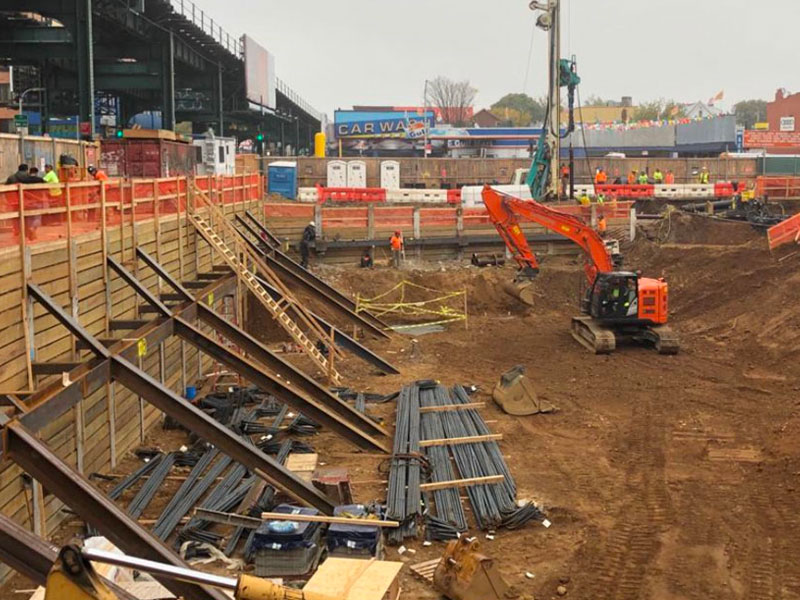Comprehensive Excavation Methods: Grasping the Fundamentals for Success
In the realm of building and civil engineering, the relevance of efficient excavation techniques can not be overemphasized. The mindful preparation, accurate implementation, and meticulous interest to information required in excavation tasks require an extensive technique that encompasses different basic aspects. From first dirt evaluation to the application of precaution and regular progress monitoring, understanding these core components is vital for accomplishing success in any type of excavation undertaking. The real proficiency lies not simply in comprehending these basics however in effortlessly integrating them to browse the intricacies of excavation projects with skill.
Comprehending Excavation Project Preparation

Successful excavation jobs are developed on the structure of extensive and precise preparation. The initial stage of any type of excavation project is the drawing board, where important choices are made that can dramatically affect the result of the job. During this stage, it is vital to gather all appropriate information about the site, consisting of topographical surveys, dirt composition, and any type of prospective risks that may exist. Recognizing the project spending plan, timeline, and scope constraints is crucial for developing an extensive excavation plan that makes certain the task's success.
One trick element of excavation job preparation is the growth of a detailed timeline that outlines the sequence of tasks, target dates, and milestones. By carefully considering all these variables during the planning phase, excavation projects can be performed efficiently and successfully, leading to effective end results - lancaster trenching.
Dirt Analysis and Site Assessment
Conducting detailed dirt evaluation and website assessment is a critical action in the prep work stage of any kind of excavation task. Soil evaluation includes figuring out the composition, structure, and buildings of the soil at the excavation site. This information is critical for recognizing the dirt's bearing capability, wetness content, and potential for disintegration, which are essential consider figuring out the excavation approaches and devices required for the job.
Website analysis exceeds soil analysis and encompasses a more comprehensive evaluation of the total website conditions. This analysis consists of determining any type of possible dangers, such as underground energies, environmental issues, or unpredictable surface, that might influence the excavation process. By extensively reviewing the site, project managers can develop effective excavation approaches that prioritize safety, efficiency, and ecological protection.
Making use of innovative innovations like ground-penetrating radar, dirt sampling, and drone surveys can improve the precision and efficiency of dirt analysis and website evaluation. Spending time and resources in these preliminary actions can ultimately conserve time and avoid expensive hold-ups or issues during the excavation procedure.
Devices Option and Use
Effective excavation projects depend greatly on tactical tools option and usage to ensure optimal efficiency and performance. Selecting the right equipment for the task is vital in taking full advantage of efficiency and decreasing downtime. Aspects such as the kind of dirt, depth of excavation, and project range play a considerable role in determining one of the most appropriate equipment for the task available.

Along with choosing the ideal equipment, appropriate use is essential to project success. Operators should be educated to take care of the devices safely and efficiently - lancaster trenching. Routine maintenance checks and timely repair services assist avoid break downs and make sure regular performance throughout the task
Safety And Security Steps and Regulations Conformity
In the realm of excavation jobs, prioritizing security procedures and conformity with guidelines is extremely important to making sure a legitimately audio and safe functional environment. Security actions incorporate a series of practices, consisting of performing complete website assessments, executing proper signage and obstacles, and providing sufficient safety and security training for all employees associated with the excavation process. Adherence to guidelines, such as OSHA requirements in the United States, makes sure that the excavation task satisfies the required criteria to protect employees, spectators, and the surrounding atmosphere.

Tracking Development and Adjusting Strategies
How can project supervisors effectively track the innovation of excavation jobs and adjust their techniques accordingly to enhance end results? Monitoring progression is essential for guaranteeing that excavation projects stay on track and satisfy deadlines.

Verdict
To conclude, grasping the principles of extensive excavation techniques is vital for the success of any type of task. By comprehending task planning, evaluating soil and site conditions, choosing proper devices, adhering to safety and security laws, and keeping an eye on development, task managers can guarantee a effective and smooth excavation procedure. Executing these approaches will certainly cause successful results and lessen possible dangers or setbacks during the excavation project.
The first stage of any type of excavation task is the planning phase, where critical choices are made that can dramatically impact the result of the project. Understanding the project timeline, extent, and spending plan constraints is crucial for creating an extensive excavation plan that guarantees the job's success.
Just how can predict managers effectively track the advancement of excavation get redirected here projects and adapt their methods accordingly to optimize outcomes? By carefully monitoring progress and being prepared to adapt methods, task supervisors can boost the total success of excavation projects.
By understanding project planning, evaluating soil and website conditions, selecting suitable equipment, complying with security regulations, and keeping an eye on progression, task supervisors can make sure a efficient and smooth excavation process.